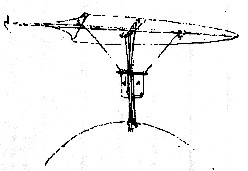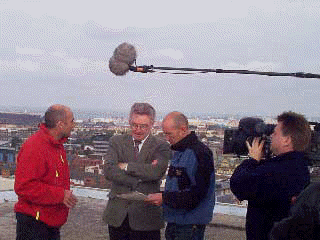Leonardo da Vinci Glider
The flight simulator at The University of Liverpool was featured in BBC1 and BBC3 documentaries on Leonardo da Vinci's machines. The simulator in the Flight Science & Technology Research Group, was used to recreate the flight of a glider based on the sketches of Leonardo da Vinci. This was part of a BBC series on Leonardo's life and work, presented by Alan Yentob and was broadcast in April 2003.

As part of the series Simon Sanderson, who has previously been involved in world speed sailing record attempts, built a scale model of the glider. The glider was placed in a wind tunnel in the Department of Engineering, and using smoke to visualise the flow of air over the glider wing, the aerodynamic characteristics were assessed.
Ben Lawrence, created a simulation model of the da Vinci glider. This was extensively tested on the simulator by former world hang gliding and paragliding champion Robbie Whittall.
The BBC visited the Flight Science and Technology Group at the University of Liverpool in September 2002 and interviewed Professor Gareth Padfield regarding da Vinci's achievements and the difficulties that may be encountered flying the full scale glider.
 Professor Gareth Padfield, Director of the School of Aerospace Engineering said, “Working with the glider team and the BBC on this project was really very enjoyable. We tried to think through the issues that da Vinci would have faced in designing the machine. When we first flew Ben's model in the simulator we realised just how unstable the glider could get if you mishandled it; I recall that Robbie was encouraged by the flight characteristics and he felt that the work in the simulator was good practice for the real thing.”
Professor Gareth Padfield, Director of the School of Aerospace Engineering said, “Working with the glider team and the BBC on this project was really very enjoyable. We tried to think through the issues that da Vinci would have faced in designing the machine. When we first flew Ben's model in the simulator we realised just how unstable the glider could get if you mishandled it; I recall that Robbie was encouraged by the flight characteristics and he felt that the work in the simulator was good practice for the real thing.”
Following the successful simulation trials, the full scale model was successfully flown in Wiltshire in November 2002. Robbie commented, “It was a privilege to fly the glider and although our model was not a perfect representation of Leonardo’s idea, it proved to me that he was most definitely thinking on the right lines. It has more than proved to me that his direction and imagination could have had man flying 500 yrs ago!”